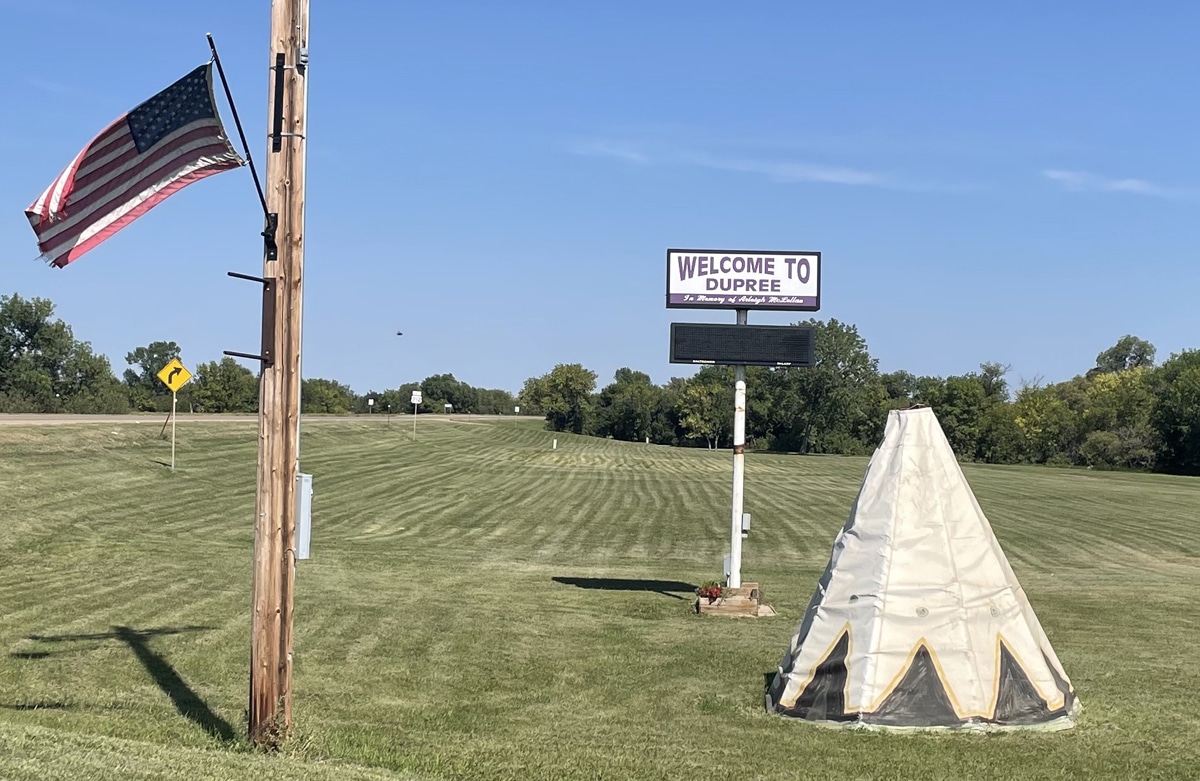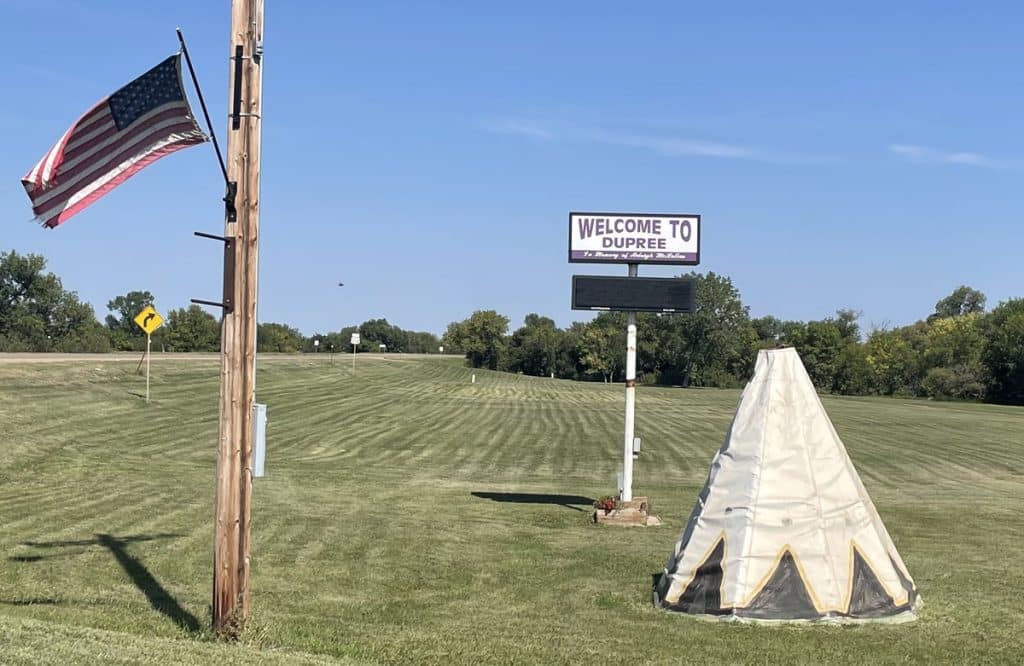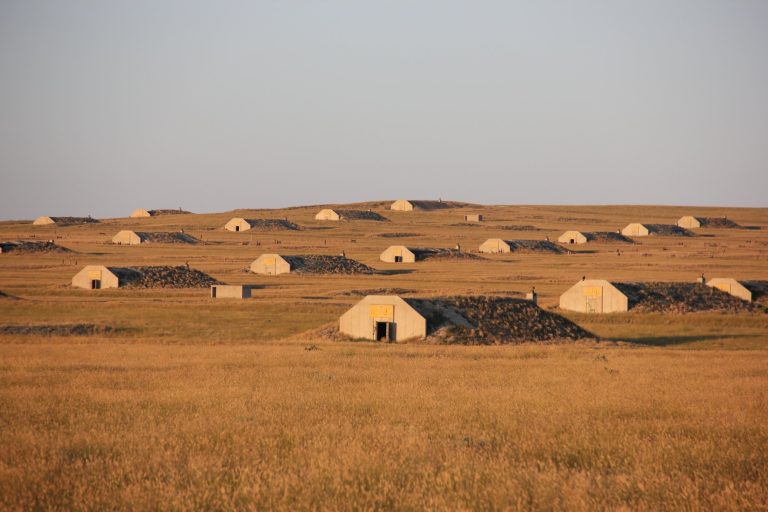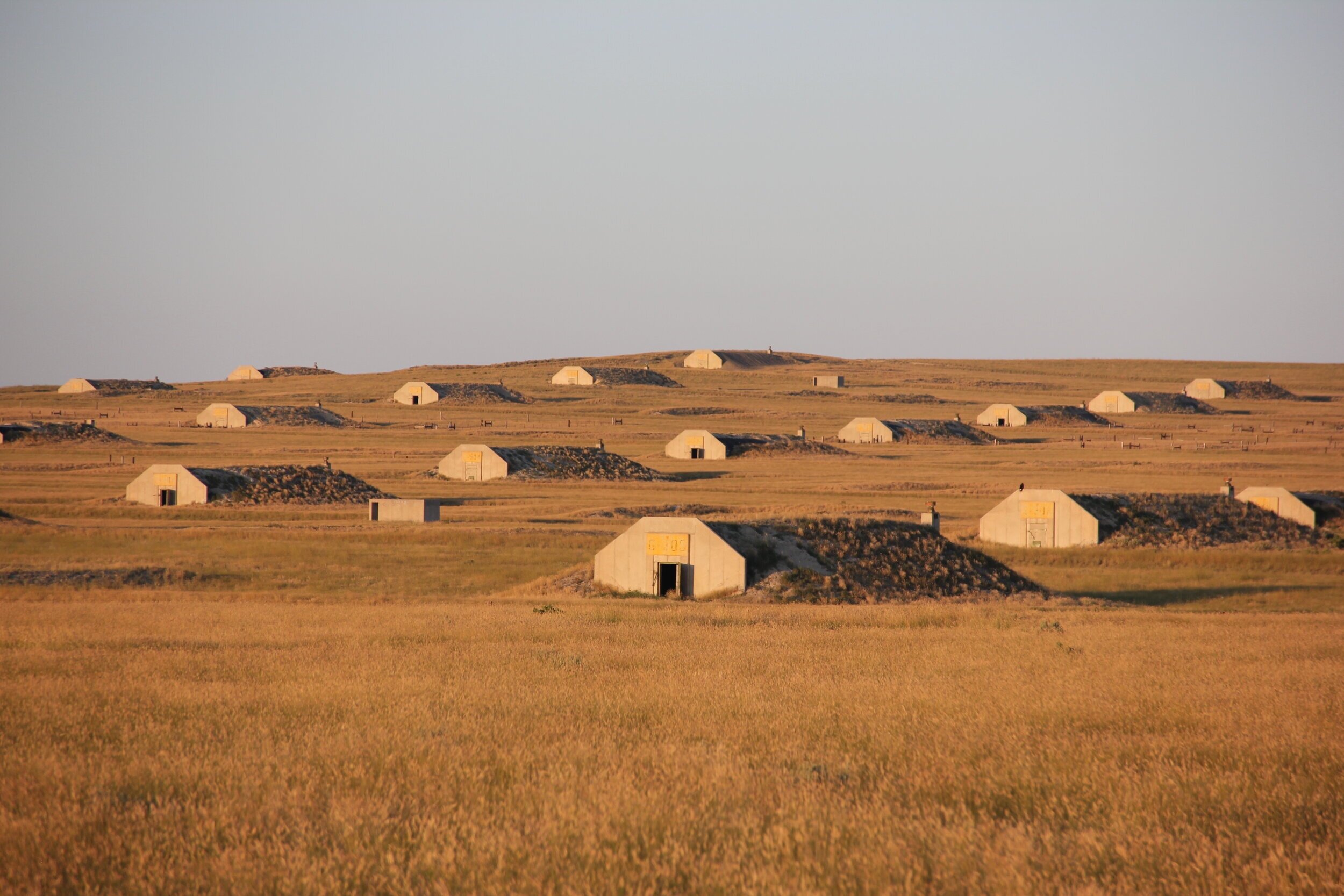DUPREE, S.D. A child abuse allegation against a teacher at Dupree Elementary School prompted the Cheyenne River Sioux Tribe to take the unusual step of banning the teacher, a principal and the superintendent from reservation lands where the public school is located.
As a result, the three employees have been unable to work at the school since the beginning of the new academic year in a district with high-need students and a poor track record of student achievement.
Tribal police continue to investigate the abuse allegations, which include slapping one child and forcefully grabbing another. The teacher could face criminal abuse charges while the two administrators could be charged with breaking a South Dakota law that requires many professional employees to report potential abuse.
Those banned from the reservation, or “excluded” in legal terms, include longtime teacher Sarah Shaff, Dupree Elementary School principal Cindy Lindskov and superintendent Keith Fodness, who also had to leave his home in Dupree due to the exclusion.
Exclusion dividing the Cheyenne River Sioux Tribe community
The exclusion of the employees from the lands of the Cheyenne River Sioux Tribe (CRST) appears legal under the tribe’s status as a sovereign nation, though an attorney for the three non-Native employees is challenging the legality in tribal court.
And yet, the exclusion of the employees by the tribal council, and the handling of the abuse claims by tribal authorities, has caused division among many in this sparsely populated region of north-central South Dakota.
The exclusion and investigation have continued even though the two parents who filed the initial child abuse allegations have dropped their legal claim, according to tribal court records obtained by News Watch.
Questions have been raised about the handling of the case by tribal officials, with some locals expressing concern that the dramatic step of exclusion was taken before the abuse claims were fully investigated.
The exclusion requires further tribal court action before it can be lifted.

The Dupree School District serves about 365 students in grades K-12 and 100% of the students are considered “economically disadvantaged” by the state. (Photo: Bart Pfankuch / South Dakota News Watch)
Some fear the loss of three staff members will negatively impact the hundreds of children in the district and that it could make it more difficult to hire educators on reservations, a problem compounded because of an overall teacher shortage.
“The kids are absolutely the losers in this, all the kids,” said state Rep. Oren Lesmeister, a Democrat from Parade, who represents the area that includes the Dupree schools.
“Beyond that, it makes it harder for any teacher to want to come work here because basically at any time they could lose their job instantly, which is a big deal across the state but especially on our reservations.”
And hovering over the entire situation is a concern that the exclusion of three white teachers by the tribal council could damage fragile race relations on and off the Cheyenne River Indian Reservation.
“I hope it doesn’t become that,” said Medina Matonis, a member of the Dupree School Board. “There’s no reason to turn this into an Indian versus white person thing. There’s no need for this to be seen as racial.”
Police investigation on Dupree School District employees remains ongoing
News Watch contacted or tried to contact several people involved in the exclusion, though many did not want to be interviewed. Fodness and Lindskov declined comment. Dupree High School principal Russell Budmayr, who is serving as interim superintendent during the exclusion, also refused to comment when reached by phone.

Keith Fodness
A call to the office of CRST chairman Ryman LaBeau was not returned. And a spokeswoman for the state Department of Education, Nancy Van Der Weide, declined to comment for this story. Jason Rumpca, a Pierre attorney representing the three school employees, also declined comment.
CRST police chief Charles Red Crow confirmed in an interview with News Watch that an active child abuse investigation is underway by his department. Red Crow said that when a judge signed the exclusion order for the three school employees, his department enforced the order and that the three left the reservation of their own accord.
Red Crow said the tribe takes exclusion orders seriously because officials realize it can affect a person’s living situation or ability to keep a job.
Red Crow said the tribe doesn’t have authority to bring criminal charges against non-Native Americans. But it would turn its finding over to the FBI for further action if it determines that child abuse or any other crime did occur, he said.
Cheyenne River Tribe acts to ‘protect its children’
According to tribal documents and proclamations posted to Facebook, the Cheyenne River Sioux Tribal Council voted on July 13 to exclude the three employees from the reservation. LeBeau, the tribal chairman, then wrote a letter to Red Crow to enforce the exclusion action.
After seeing extensive debate surface on social media, the tribe expounded on the situation in a letter to tribal members on Aug. 23, explaining the tribe’s “efforts to protect its children” and stating that due process is being followed in regard to its investigation and the exclusion of the three school employees.
The letter indicates that Shaff faced allegations of “alleged physical and emotional abuse against multiple children.” It states that Lindskov and Fodness failed to adequately investigate or report the abuse claims.

Cindy Lindskov
The letter said the administrators failed to act legally under a South Dakota law that requires people in numerous professions to report allegations of child abuse or neglect. The Class 1 misdemeanor carries a maximum punishment of a year in prison and a $2,000 fine.
The letter notes that “various non-school agencies” are now investigating the abuse allegations and reaffirms the tribe’s commitment to “protect all children on our homelands.”
“The Tribal Council takes very seriously any claims of alleged abuse of our children and will always act to protect our children, especially given the historical trauma and systemic racism faced by Lakota children at the hands of the school system,” the letter states.
“No child should be forced to accept abuse or feel silenced in order to retain teachers and administrators. Our children are not second-class citizens and we should not expect our teachers and administrators to be held to a lower standard than would be acceptable anywhere else in the United States.”

Abuse complaint against Dupree employees made in April
According to court documents obtained by News Watch, tribal action on the allegations began in April when two tribal members said Shaff abused their son and daughter nearly a year ago.
In a complaint filed in tribal court on April 23, plaintiffs Lance Jordan Frazier and Harold Gabriel Hollow said they were seeking “$1.2 million and/or $1.0 million” in punitive damages for “emotional distress, mental anguish and racial profiling, defamation of character.”
The complaint alleges that in October the boy told the men that Shaff “hit him in the head” if his schoolwork was wrong, and that she also intimidated the boy and “other students of color” in the classroom.
The complaint states that the girl told them that Shaff grabbed her arm so tightly that it caused pain.
“They (the children) then mentioned how they were scared to get any answers wrong because they did not want (Shaff) to slap them in the head,” the complaint states.
The claim also notes that the boy has since undergone counseling and has stomach pains due to emotional trauma when he returns to the school.
Parents say meetings were fruitless
The plaintiffs say that on Oct. 17, they met with Shaff and Lindskov at Dupree schools to discuss the situation.
The men said Shaff denied the accusation and Lindskov yelled at them and refused to further investigate their claims. The complaint alleges that at the meeting, Shaff denied “the allegations of hitting and mistreatment of Native students in her classroom.”
The two men also said in the complaint that they had personally investigated further and had “spoken to other parents who mentioned the same experience with this teacher and principal.”
The complaint states the two men also met with Fodness and Lindskov and eventually filed a complaint with law enforcement in Eagle Butte, the headquarters for the CRST. The complaint also states that Fodness suggested moving the boy from Shaff’s classroom to another teacher’s classroom.
The men said they tried to meet with the Dupree School Board but were denied. They also alleged that Lindskov retaliated against them by sending letters indicating a problem with the attendance of another of their children, an issue they thought had been previously resolved.
School employees’ attorney responds in court
On May 30, Rumpca, the defendants’ attorney, filed a motion on behalf of Shaff and Lindskov denying the allegations against them and asking to dismiss the complaint filed by Frazier and Hollow. The filing cites federal case law that Rumpca said shows the CRST court lacks jurisdiction over the two school employees.
The filing references a 1981 federal case, Montana v. U.S., which states that in most cases, tribes do not have legal jurisdiction over the activities of non-tribal members. The filing claims the tribal court does not have jurisdiction over non-Native American, non-tribal members who work at a public school on tribal lands except under certain emergency circumstances that Rumpca argues were not met in this case.
In a subsequent court filing, Rumpca noted that on Aug. 22, Frazier and Hollow voluntarily dismissed their child abuse complaint and their monetary settlement request.
Jim Leach, a Rapid City attorney with experience in tribal law, said the CRST court system has jurisdictional authority over the reservation and has the autonomy to exclude or banish people if certain legal conditions are met.
“Basically, tribal courts function entirely separate from the state and federal court systems in the U.S.,” Leach said. “Subject to that, they can do anything they want as long as it doesn’t violate someone’s federal rights.”
Legal basis for exclusion challenged
But on Aug. 31, Rumpca filed four additional motions in tribal court also pointing to the Montana v. U.S. as a basis to deny the right of the CRST council to issue an emergency exclusion of the three school employees from reservation lands.
The filing notes that the exclusion was not an emergency, and that the tribal council lacks jurisdiction to exclude the school employees. It concludes that the exclusion order should be lifted or a hearing to reconsider the exclusions should be convened. The filing also denies any claims of wrongdoing by Shaff, Lindskov or Fodness.
The filing concludes by noting that the emergency exclusion order has created negative consequences for the three school employees and students at the school. It calls the lack of due process afforded the school employees as “alarming and discouraging.”
The tribe’s actions “have had far-reaching consequences beyond disruption of the personal and professional lives” of the school employees, the filing states. “Taking away a longtime teacher, principal and superintendent from the Dupree K-12 school negatively impacts the quality of education of all students.”
As of Sept. 5, it was unknown if the tribe had responded to the Aug. 31 filings.
Dupree School District Board member putting faith in the process
Matonis, of the Dupree School Board, said she is waiting to see how the tribal legal processes surrounding the dispute play out before making a judgment on whether exclusion of the school employees was necessary.
She said it is proper that if child abuse allegations are raised there should always be a full investigation and appropriate consequences if abuse is proven.
“As a tribal nation, we believe our children are our most sacred things,” she said.
Matonis said the loss of the three employees is a distraction to the district and not good for students. But she added that other district employees are stepping up to avoid disruption of learning as the controversy rolls on.
She said she has heard from tribal and non-tribal members who support the school and the three employees named in the complaint.
Matonis also said she hopes the community will remain focused on the facts and continue to do what is best for children in the school system.
The schools in Dupree, located on U.S. Route 212 between Faith and Eagle Butte, struggle with significant teaching challenges. The schools, which have about 365 students in all, saw low subject proficiency scores in 2021-22, with 23% of students proficient in English language, 13% proficient in math and 17% proficient in science, according to the South Dakota Report Card.
All students in the district are listed as “economically disadvantaged” and the chronic absenteeism rate (10 or more unexcused absences in a year) was 54% in 2021-22. The district includes about 54 instructional employees among a total staff of 83, according to the district website. About 80% of the students are American Indian or Alaska Native and 11% are white, according to the state.
Questions about tribal actions in Dupree School District
Robyn Depoy is a rancher from Lantry, an alumni of the Dupree schools and a parent whose son attends Dupree High School.
She has kept a close watch on the dispute between the tribe and the school employees and is frustrated that the tribal council appears to have acted to exclude the employees before fully investigating the claims against them.
While Depoy acknowledged she is unsure if any abuse occurred, she remains concerned that it appears the tribal council acted quickly without all the facts.

“One tribal council member said banishment is like the last straw, so why are we taking the harshest punishment in this case before we even fully look into it?” Depoy asked in an interview with News Watch.
The exclusion is causing division in the community, Depoy said. She echoed concerns that it could hinder teacher recruitment and could cause educators to be afraid to manage student misbehavior in their classrooms.
Depoy also said the exclusion of the school employees could make some area residents afraid to speak up about tribal matters over fears they also could be expelled from the reservation.
“It really has, to a certain extent, divided people in the school community and we don’t want it to be that way,” she said.
“Everything is just in limbo right now, and we’re just afraid this opens the door for anybody else that has any concerns to speak up because if you do, this is what could happen to you — you could lose access to your home or your job.”
Hoping for positive outcomes
Lesmeister, the House minority leader, said the South Dakota Professional Practices Commission reviewed and then dismissed a complaint filed against Lindskov and Fodness. He said he was unsure if the state is continuing to investigate Shaff for any professional violations.
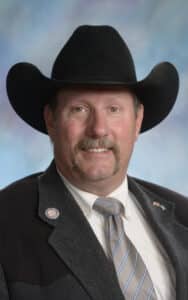
But Lesmeister said the tribal government is apparently unsatisfied with the outcome of any non-tribal investigations and wants to continue its investigation into abuse allegations and the claims of failure to report the abuse by the two administrators.
Lesmeister said he thinks the tribal council might have jumped the gun by excluding the three school employees based only on an allegation of abuse.
But he said he hopes the tribal and non-tribal agencies involved can work together to bring the situation to a fair and proper conclusion and use the situations as a blueprint for positive relationships moving forward.
“The two different governments really need to work together, and that’s what needs to happen more,” Lesmeister said. “I hope we can use this as a springboard to working together better.”
